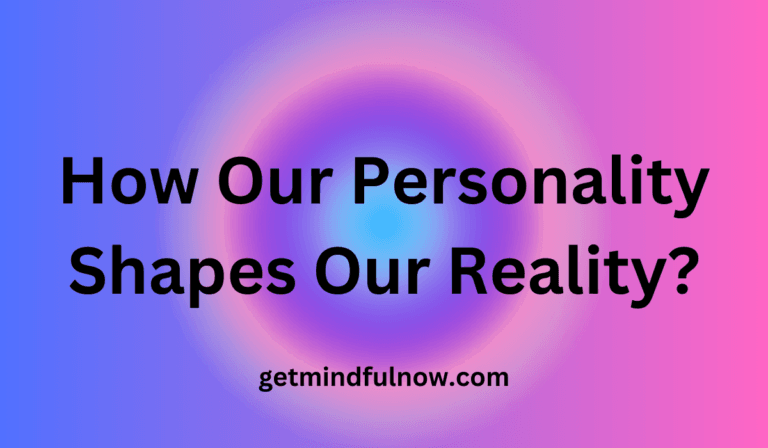Have you ever paused to think about how your personality might be shaping the reality you live in? I’ve often found myself wondering why certain patterns keep showing up in my life. The deeper I dived into this question, the clearer it became—our personality acts like a lens, filtering the world we see and experience.
Let me share something personal. There was a time when I believed I was destined to fail. Every challenge felt like proof that I just couldn’t get it right. It wasn’t the world telling me I was a failure; it was me. My thoughts and feelings, shaped by past experiences, were reinforcing this narrative. And that’s the thing about our personalities—they shape how we perceive and interact with reality.
How Personality Shapes Our Reality
Your personality is your unique mix of thoughts, feelings, and behaviors. It’s what makes you, well, you. But it’s also the lens through which you interpret everything around you. For example, imagine you’ve had a boss who was highly critical. Over time, your brain forms a neurological map associating bosses with negativity. Now, every time you’re around a new manager, you might brace yourself for criticism—even if they’re nothing like your previous boss.
This isn’t just about work; it’s about every part of life. If you’ve experienced betrayal in the past, you might find yourself doubting people’s intentions, even when there’s no reason to. This isn’t because betrayal is your destiny; it’s because your personality, shaped by past pain, is influencing how you interpret the present.
The Brain’s Role in Perception
Our brains are incredibly powerful—and sometimes a little stubborn. When you experience a strong emotional event, your brain creates a vivid map of it. This is why certain memories can feel as real as the day they happened. The more you revisit those memories, the stronger the neural connections become.
Here’s a simple example. Let’s say you had a public speaking disaster in school. Years later, the mere thought of speaking in front of a crowd might bring up the same fear and embarrassment, even if you’ve grown and learned since then. Your brain is replaying the old tape, convincing you that’s still your reality.
But here’s the good news: your brain can change. Through the science of neuroplasticity, we know that those neural pathways aren’t set in stone. With intentional effort, you can rewire your brain to think and feel differently, creating a new reality for yourself.
Shifting Your Beliefs
I’ll never forget the moment I realized my beliefs were holding me back. For years, I carried the idea that success was for other people, not me. It took hitting rock bottom to finally ask myself, “How bad does it have to get before I decide to change?” That’s when I stumbled across this quote: “When the pain of remaining the same surpasses the pain of change, that’s when we change.”
For many of us, it takes a significant event—a breakup, a diagnosis, a financial setback—to shake us out of old patterns. But it doesn’t have to be that way. You can decide, right now, to examine your beliefs and start shifting them toward what you truly want in life.
How Childhood Shapes Reality
Think back to your childhood. What messages did you absorb about yourself and the world? Maybe you were told you had to work hard to earn love, or that money was something only “lucky” people had. These early experiences are like seeds, growing into the beliefs and behaviors that shape your reality today.
For me, I grew up believing that being vulnerable was a weakness. It took years of unlearning to realize that vulnerability is actually a strength. Recognizing the impact of these early messages helped me rewrite the story I was telling myself.
Practical Ways to Rewrite Your Reality
So, how do you change your reality? It starts with awareness. One of the most powerful tools I’ve found is mindfulness. It’s about catching yourself in the act of thinking those old thoughts. For instance, if you find yourself blaming someone or feeling like a victim, pause and ask, “Is this thought helping me create the life I want?”
Therapy can also be a game-changer. A therapist can help you understand the patterns you’ve been stuck in and guide you toward creating new ones. And then there’s meditation. I used to think meditation was just about relaxation, but it’s so much more. It slows down your brain waves, creating space for new ideas and beliefs to take root.
The Power of Meditation
Meditation has been my anchor. When I sit quietly and let my mind settle, it’s like clearing a foggy windshield. Suddenly, I can see where I want to go and how to get there. If you want to change your personality—and by extension, your reality—meditation is a tool you can’t afford to ignore.
Also Read: Why Meditation Might not Be Helping You Achieve Your Dreams?
Final Thoughts
Changing your reality isn’t about magic; it’s about choice. It’s about deciding that the story you’ve been living isn’t the one you want to continue. By understanding the connection between your personality and your reality, you can start to rewrite the script. And trust me, the new story is worth it.
You can also watch this great 3 minutes video to learn more about How our personality shapes our reality.
FAQs
A. How do personalities influence our daily lives?
Our personalities shape our thoughts, behaviors, and reactions, significantly impacting our daily experiences and interactions.
B. Can personal realities change over time?
Absolutely, personal realities are fluid and subject to change, influenced by experiences, growth, and evolving perspectives.
Unraveling the correlation between personalities and realities offers a deeper understanding of how our perceptions are shaped and molded.
It’s a journey that highlights the significance of self-awareness, environmental influences, and the nuances of belief systems in crafting the tapestry of our individual realities.
I hope this has helped you gain a deeper understanding of how our personality shapes our personal reality. I’ll be sharing more about this in upcoming blogs.
Feel free to share your thoughts or experiences in the comments section, and I would love to engage in a conversation with you!









The interplay between personality and perception profoundly shapes our reality. Understanding this can empower us to reconstruct and enhance our realities.
Absolutely right, we are more than just physical beings with souls. We hold the power to change our lives by changing ourselves. The process is long but worthwhile.